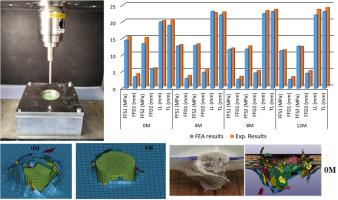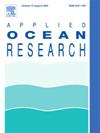玻璃/环氧复合材料的准静态冲剪行为:人工海水环境中的实验和数值研究
IF 4.3
2区 工程技术
Q1 ENGINEERING, OCEAN
引用次数: 0
摘要
加强对纤维增强聚合物复合材料如何应对高速冲击的了解至关重要,尤其是与准静态冲剪试验(QS-PST)相比。虽然研究人员已通过实验和数值方法对玻璃纤维增强复合材料的 QS-PST 进行了广泛研究,但通过实验和数值方法研究老化效应的研究还存在明显差距。本研究对在人工海水环境中老化的 S2 玻璃纤维增强环氧树脂复合材料进行了 QS-PST 试验。复合材料板采用真空辅助树脂传递模塑(VARTM)工艺制作。测试样品的老化时间分别为 4 个月、8 个月和 12 个月。对样品进行了 QS-PST 试验,然后使用 LS-DYNA 和 MAT 162 材料模型进行了有限元分析(FEA)。将复合材料的机械性能纳入有限元分析,并使用所提出的材料模型模拟了老化效应,最大误差为 8.08%。结果表明,老化过程导致复合材料的冲剪强度降低了 26.84%。这些研究结果为了解复合材料在海洋环境中的降解机制提供了有价值的见解,有助于制定在此类条件下提高耐用性和性能的策略。本文章由计算机程序翻译,如有差异,请以英文原文为准。

Quasi-static punch shear behavior of glass/epoxy composite: Experimental and numerical study in artificial seawater environment
Enhancing the understanding of how fiber-reinforced polymer composites respond to high-speed impacts is crucial, particularly in comparison to Quasi-Static Punch Shear Test (QS-PST). While researchers have extensively investigated QS-PST in FRP composites through experimental and numerical approaches, there's a notable gap in studies addressing the aging effects through both experimental and numerical methods. In this study, the QS-PST was conducted on S2 glass fiber reinforced epoxy composite materials aged in an artificial seawater environment. Composite plates were fabricated using Vacuum-assisted resin transfer molding (VARTM). Test samples were subjected to aging for durations of 4, 8, and 12 months. Experimental QS-PST were performed on the samples, followed by Finite Element Analysis (FEA) using LS-DYNA and the MAT 162 material model. The mechanical properties of the composite material were incorporated into the FEA and aging effects were simulated with a maximum error of 8.08% by using the proposed material model. The results indicated that the aging process led to a reduction in the punch shear strength of the composite by up to 26.84%. These findings provide valuable insights into the degradation mechanisms of composite materials in marine environments, aiding in the development of strategies for enhanced durability and performance in such conditions.
求助全文
通过发布文献求助,成功后即可免费获取论文全文。
去求助
来源期刊

Applied Ocean Research
地学-工程:大洋
CiteScore
8.70
自引率
7.00%
发文量
316
审稿时长
59 days
期刊介绍:
The aim of Applied Ocean Research is to encourage the submission of papers that advance the state of knowledge in a range of topics relevant to ocean engineering.
 求助内容:
求助内容: 应助结果提醒方式:
应助结果提醒方式:


